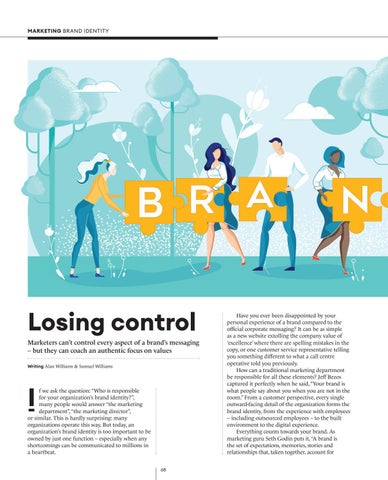MARKETING BRAND IDENTITY
Losing control Marketers can’t control every aspect of a brand’s messaging – but they can coach an authentic focus on values Writing Alan Williams & Samuel Williams
I
f we ask the question: “Who is responsible for your organization’s brand identity?”, many people would answer “the marketing department”, “the marketing director”, or similar. This is hardly surprising: many organizations operate this way. But today, an organization’s brand identity is too important to be owned by just one function – especially when any shortcomings can be communicated to millions in a heartbeat. 68
Have you ever been disappointed by your personal experience of a brand compared to the official corporate messaging? It can be as simple as a new website extolling the company value of ‘excellence’ where there are spelling mistakes in the copy, or one customer service representative telling you something different to what a call centre operative told you previously. How can a traditional marketing department be responsible for all these elements? Jeff Bezos captured it perfectly when he said, “Your brand is what people say about you when you are not in the room.” From a customer perspective, every single outward-facing detail of the organization forms the brand identity, from the experience with employees – including outsourced employees – to the built environment to the digital experience. Everything counts towards your brand. As marketing guru Seth Godin puts it, “A brand is the set of expectations, memories, stories and relationships that, taken together, account for
